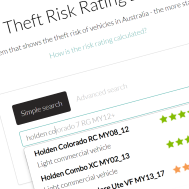Car theft.
Most of us rely on our cars, whether it be for work, taking the kids to school or social activities. Having a car stolen can be stressful, inconvenient and costly. Many think it will not happen to them but around one in every 120 Australian homes fall victim to car criminals each year. The good news is whether you own a late-model car or something a little more vintage, by taking a few simple precautions you can greatly reduce your risk of becoming a victim of theft.
Facts
- In Australia a car is stolen every 11 minutes.
- Advances in security technology have made it impossible to simply ‘hot wire’ a modern car.
- 70 per cent of cars are stolen with their own keys.
- Half of all cars stolen are taken from the home, including driveways, carports and garages.
- Offenders will sneak into homes, taking advantage of unlocked doors and windows.
- Often the homeowner is present and for this reason, we use the term ‘sneak thefts’ to describe these types of offences. In most cases, thieves will actively avoid coming into contact with the homeowner. In fact, in 95 per cent of incidents there is no confrontation with the homeowner.
- 77 per cent of cars are stolen for short term purposes not involving the vehicle's value which may include joyriding, as a temporary means of transport, or for use in the commission of another crime.
- Car theft is stressful, inconvenient, and costly; and contrary to popular belief insurance does not always cover the cost with victims on average out of pocket $5,000.
What can you do?
When at home
Pop your car keys out of sight and away from windows and doors. Don’t leave keys lying around on tables, benches, or key hooks. If a thief can see your unattended keys, it is likely that he or she can figure out how to get hold of them.
Lock doors and windows and ensure everyone in the household is doing the same thing.
Stop sneak theft.
Pop your car keys out of sight and away from windows and doors. Don’t leave keys lying around on tables, benches, or key hooks. If a thief can see your unattended keys, it is likely that he or she can figure out how to get hold of them.
Lock doors and windows and ensure everyone in the household is doing the same thing.
Stop sneak theft.
Also
- Never hide a second set of keys anywhere in your car: thieves know where to look
- Don’t tag your keys with your name or address – use a mobile phone number or driver licence number instead.
- If your home has been broken into and your keys are stolen, change the cylinders in the locks or fit additional locks.
- Never leave your car unattended with the key in the ignition.
- If the car is at home but you are out, make sure you have all the keys with you.
- Remove temptation- when leaving your vehicle unattended, fully close the windows, lock all the doors, and take the keys with you.
- Theft from cars is very common. Never leave items such as mobile Phones, bags, laptops, or other valuables in sight in your unattended vehicle.
Enhance your home's security - a secure home means a secure car
Take NHW’s free online quiz ‘How Safe Is My Place’ to find out how secure your home is and learn how to reduce your risk of being burgled. Everyone who completes it gets a personal report to use as a plan of action.
Tips for owners of older cars
Older cars are not equipped with the security features of newer vehicles such as an engine immobiliser. The ease with which older cars can be broken into and driven away using simple tools such as a coat hanger and screwdriver makes them the perfect target for young thieves looking for a joyride or a quick mode of transport. To reduce the risk of your older car being stolen:
- Fit an after-market engine immobiliser. It can cost as little as $220 and will prevent your car from being able to be hotwires;
- Remove all valuables such as mobile phones, tablets, bags, and sunglasses from your car to reduce temptation;
- Park wisely - if you have off-street parking, use it; and
- As in the case of late model cars - Potect your car keys. An engine immobiliser cannot help you if a thief has access to your keys.
Other resources
For more information on how to protect your motorcycle
Protect your bikeFor more information on safely buying a used vehicle
Buying a used vehicle
